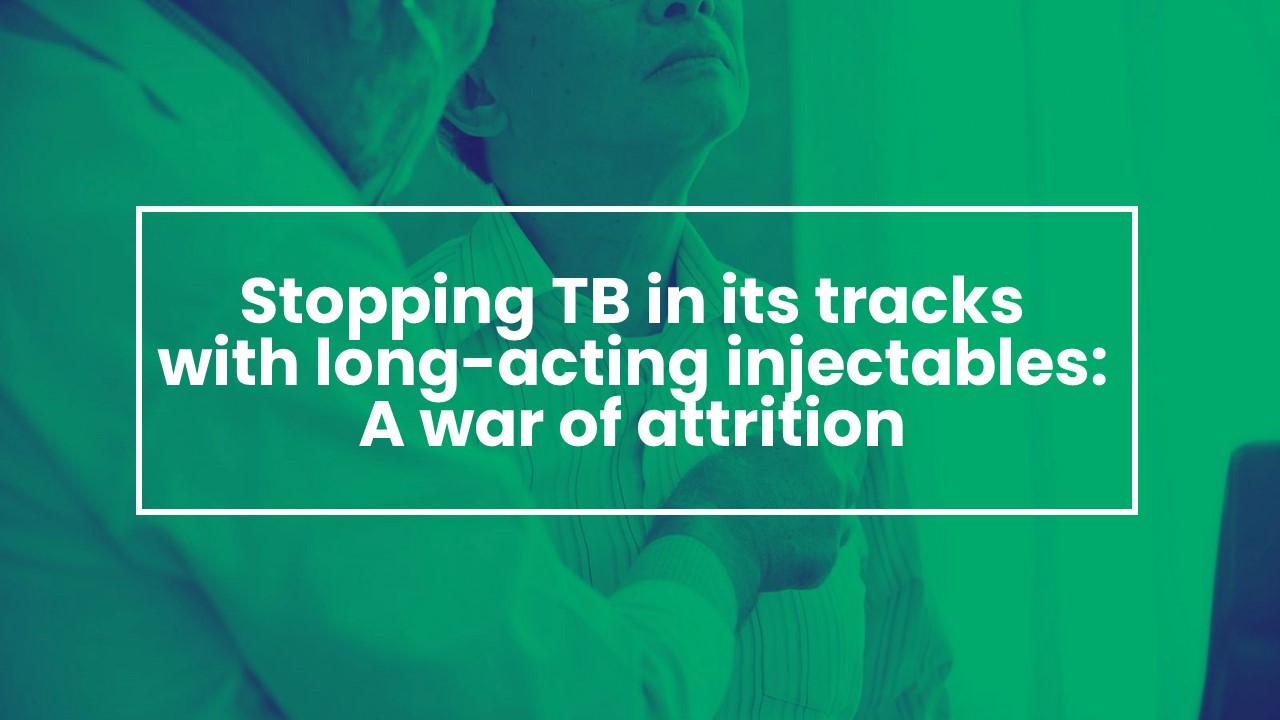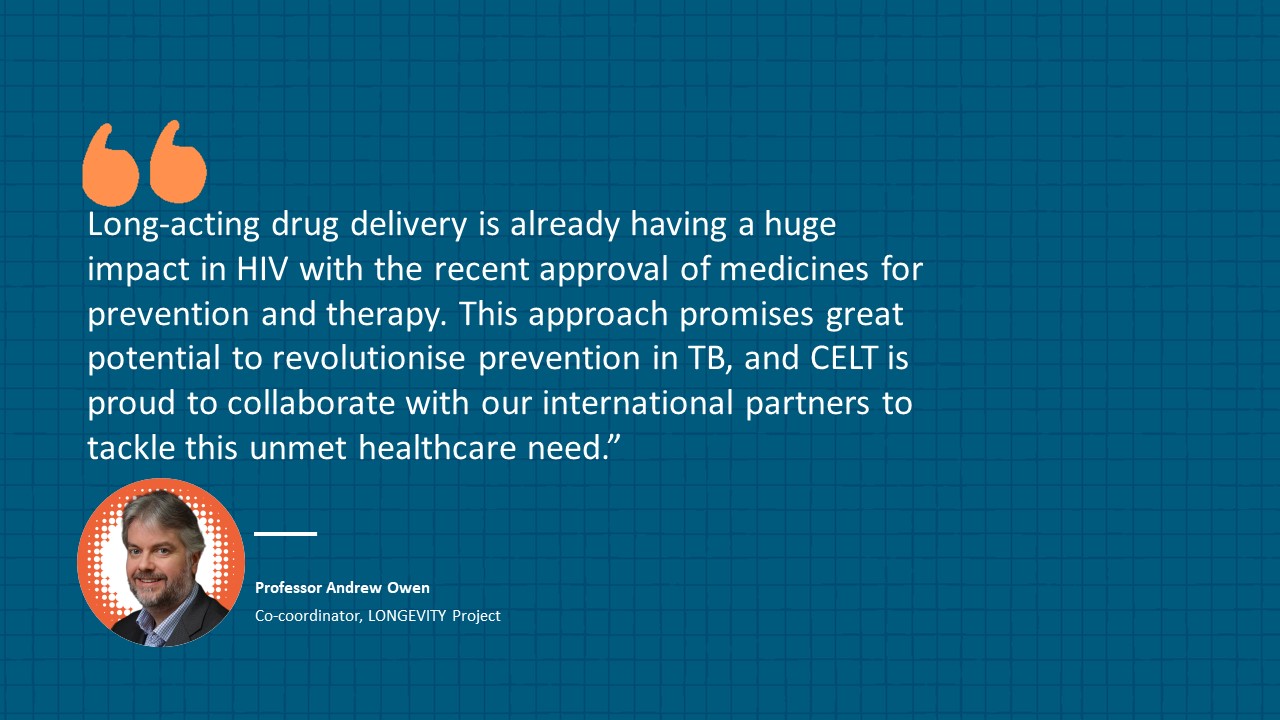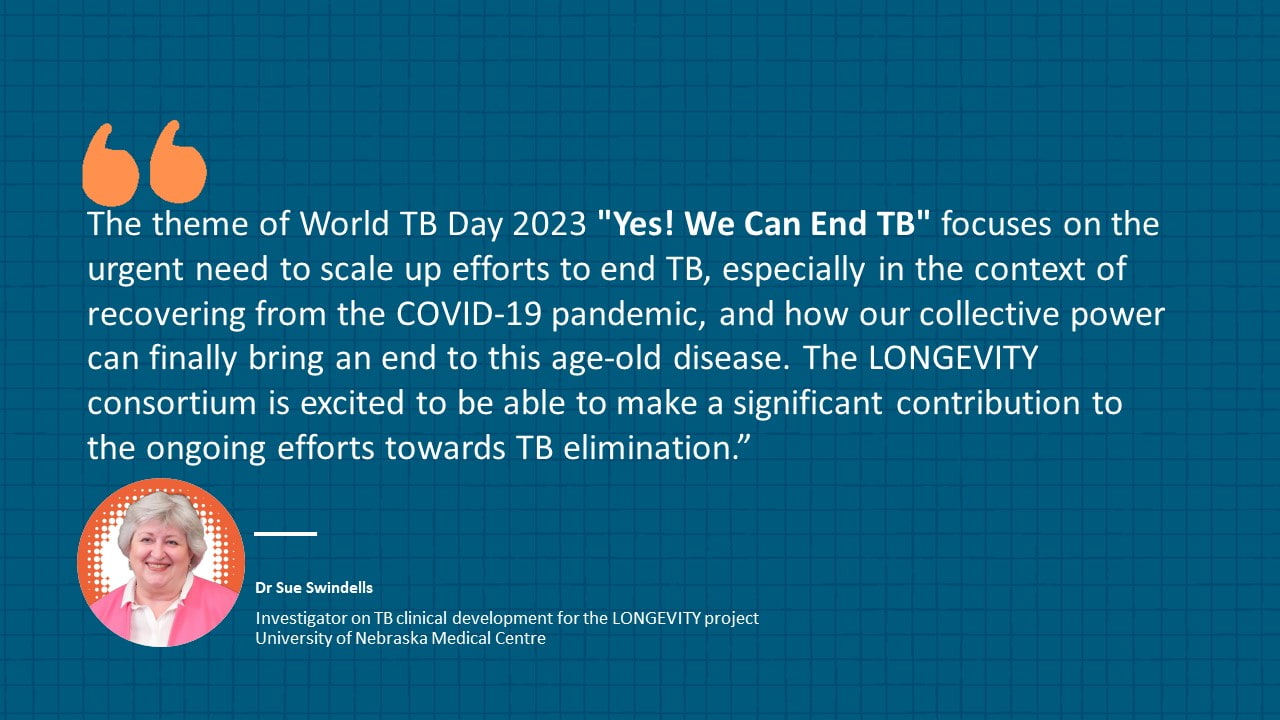
World TB Day 2023, themed 'Yes! We can end TB!', is set to inspire a renewed sense of hope in the fight against the TB epidemic. The campaign seeks to encourage leaders to take bold steps, increase funding, adopt innovative solutions, and act faster to curb the spread of the disease.
The TB Burden
Globally, the estimated number of deaths from TB sadly increased between 2019 and 2021, reversing years of decline between 2005 and 2019. It is now ever more critical that advancement in healthcare programmes is accelerated in the effort to reduce the TB burden.
In 2020, CELT was granted $40 million (USD) by global health agency Unitaid to spearhead the LONGEVITY project, a global consortium that strives to create revolutionary long-acting medicines capable of reducing instance of lethal diseases and enhancing healthcare programmes in low- and middle-income countries (LMICs). The LONGEVITY consortium's aim for TB is to prevent the onset of TB disease by introducing an innovative prevention strategy for LMICs, which currently bear a staggering 98% of the global TB burden. This initiative aims to make a significant impact on improving healthcare outcomes.

Our strategy is to prevent the spread of TB in LMICs by treating latent TB infection (LTBI). In LTBI, TB bacteria are present in the body, but the immune system may be able to control their growth and prevent them from causing active disease. People with LTBI do not feel sick and cannot spread the bacteria to others. However, for some people, especially if the immune system becomes weakened (such as in people with HIV or who are receiving certain medications), the bacteria can become active and cause active TB disease. This is why people with LTBI are recommended to take TB Preventive Treatment (TPT) to get rid of the bacteria. These medications are taken for anywhere between one month and three years and are mostly effective if adherence to medication is maintained. However, there are a number of factors that make adherence to oral TPT regimens challenging resulting in low uptake of medication and poor treatment completion rates;
Pill Burden
Pill burden refers to the number of pills a patient is required to take daily or over a certain period of time to manage their condition. High pill burden can have negative effects on patient outcomes, including low adherence to medication regimens, decreased quality of life, increased risk of adverse drug reactions and a higher financial impact on patients. TPT may come with a high pill burden with regimens which can last up to thirty-six months, and sometimes requires taking hundreds of tablets in total.
Stigma
In the context of TB prevention, stigma can arise due to misconceptions about LTBI, leading to individuals or communities being discriminated against. This can create barriers to TB prevention efforts, including reluctance to get tested or treated, lack of adherence to medication regimens, and fear of social isolation.
How do long-acting medicines work?
Traditional oral therapies involve patients taking regular tablets, the contents of which are eliminated from their bodies over a short period of time. We aim to reformulate existing oral TPT as long-acting injectable versions which can potentially deliver an entire course with a single administration, providing a simple, effective and sustainable option for those in most need. Our long-acting formulations are injected into the body, where the drug is released slowly, over a prolonged period. Find out more about how our technology works.
Once our long-acting medicines have been injected, the body is protected against the onset of active TB disease. It is with this strategy that we can relieve patients of pill burden, stigma and improve completion rates of TPT to provide better protection from TB for those in most need of improved healthcare.
Significant progress
Since the LONGEVITY project commenced, we have made huge steps towards our target. After successfully overcoming several technological challenges, early preclinical characterisation of our current formulations have proven to be successful. Our partners at Johns Hopkins University (JHU) and Clinton Health Access Initiative (CHAI) have also had great success developing a combination partner and initial scale-up efforts have begun. The development of the novel prodrug represented a significant milestone for the project.
In-vivo testing of our long-acting formulation for TB has been completed demonstrating that our desired target exposures can be met with a single injection in animal models. Further analysis of this candidate is underway with preclinical efficacy models being conducted at JHU.
Furthermore, we have succeeded in securing a supply of the active pharmaceutical ingredient in our formulation which is critical for continuation of our development programme.
A licence agreement between University of Liverpool spin-out company Tandem Nano Ltd and The Medicines Patent Pool (MPP) was signed. The non-exclusive, worldwide licence covers the patents and expertise of promising long-acting injectable technologies (LAIs) to be applied to the LONGEVITY project.
Our simplified medicines could offer a vital lifeline to the millions of people at risk of TB in LMICs and has the potential to relieve pressure on healthcare programmes in these communities by reducing the number of patients requiring complex therapies for active disease.

To keep up to date with our progress, sign up to our newsletter.
Useful TB Resources
LONGEVITY Project | WHO Factsheet | TAG TB Project News | StopTB
The LONGEVITY Project is funded by Unitaid

The project also involves critical partners and collaborators in the Clinton Health Access Initiative, Johns Hopkins University, Medicines Patent Pool, Tandem Nano Ltd., Treatment Action Group and the University of Nebraska Medical Center





